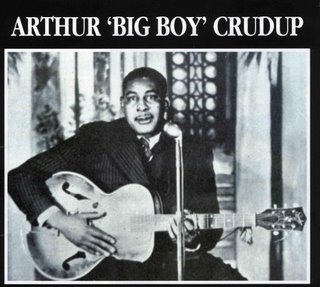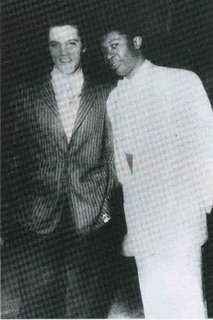
MISSISSIPPI MEADOWLARK
G C G
He sat at the feet of a black blues man
C D G
Tappin’ his toes and clappin’ his hands
C G
Got a job drivin’ trucks, but he had another plan
C G D
Cut an Arthur Crudup record and that’s how it all
G
began
C G D G
Hark, hark, let the truckie make his mark
C G D G
Singin’ like a Mississippi meadowlark
The racists hated him "singin’ like a nigger"
But he didn’t give a damn he just got bigger and bigger
When his left leg moved it made the old folks snigger
But the young kids thought he cut a right royal figure
Hark, hark, let that hound dog bark
Listening to the Mississippi meadowlark
Hark, hark, let that hound dog bark,
Listening to the Mississippi meadowlark
Well there’s never been a singer like the King
But they took that stallion and they broke him in
The Colonel, the Army and everything
Just took that bird and broke its wing
Hark, hark, lovers in the dark
Listening for the Mississippi meadowlark
Hark, hark, lovers in the dark
Listening for a Mississippi meadowlark
Hark, hark, lovers in the dark
Listening for another Mississippi meadowlark
In one of my earlier blogs I mentioned how I grew up listening to Elvis and became a huge fan. But just as I was getting into Elvis, he was getting into the US Army and even I could see that songs like G.I. Blues had nothing I common with the blues music that Elvis appropriated and made his own at the start of his career.
Elvis was a white working class kid in the deeply racist South. He was fascinated by the sounds of black music coming from Church gospel choirs at one end of town and from boozy juke joints at the other.
"Down in Tupelo, Mississippi," he said, "I used to hear old Arthur Crudup bang his box the way I do now, and I said if I ever got to the place where I could feel like old Arthur felt, I’d be a music man like nobody ever saw."
Elvis’ first hit record was his version of Crudup’s That’s All Right, Mama. He was immediately criticised by racists, and banned from performing in some places, for crossing the divide and singing "nigger music".

But he remained drawn to it, going down to Memphis’ Beale Street to catch acts by artists such as B.B. King (pictured with Elvis in a 1956 radio station Goodwill Revue).
The young ex-truckie also recorded Crudup’s My Baby Left Me and So Glad You’re Mine before the Colonel came along and made him clean his act up.
Crudup, (1905-1974) never saw any royalty payments from these recordings. Speaking prophetically, he once said, "I was born poor, I live poor, and I’m going to die poor."
Elvis died a multi-millionaire, bloated by the excesses of the capitalist system, a tragic testament to the old Biblical rhetoric: "What profiteth it a man that he gain the whole world yet lose his soul?"
I honour the talent of the man in this song, and try to describe, in a nutshell, where it all went wrong.
Perhaps one day a socialist Shakespeare will write a tragedy, King Elvis. As he takes his final gasps of air on the cold toilet floor, the dying singer remembers the sound of Arthur Crudup’s voice and laments, "That place, that place, all my wealth and fame for that place…"

No comments:
Post a Comment